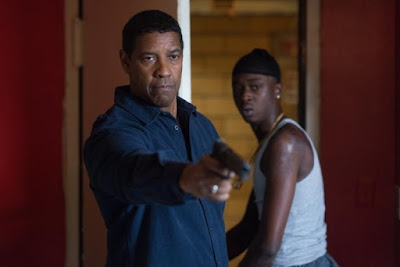 |
| Image courtesy of Lionsgate. |
Carlos Lopez Estrada's remarkable debut "Blindspotting," which was written by co-stars Daveed Diggs (a Tony winner for "Hamilton") and Rafael Casal and based loosely on their experiences growing up in Oakland, is one of the few great things to come out of 2018. You'll often hear people espouse that a given work of art is the One That America Needs Now, but this film might actually be the one.
"Blindspotting" is no less than the third film this year - after "Black Panther" and "Sorry to Bother You" - to use Oakland as a backdrop, and the latter of those two and Estrada's picture both use the town to explore themes of economic racism and white privilege. Much like Spike Lee did for Bedford-Stuyvesant with his landmark "Do the Right Thing," Estrada makes great use of the oft-overlooked California city as a character in the film itself, his camera panning down neglected blocks where homes have fallen into disrepair and then into neighborhoods becoming gentrified and forcing long-time residents to flee amid the rising costs of living.
As the film opens, Collin (Diggs) is being released from prison and placed on a year's probation for reasons that we won't discover until late in the film. He works at a moving company with his best pal, Miles (Casal), a live wire whose erratic behavior often leaves Collin on edge. But the two have been friends since their boyhood, and Miles is a staple of the neighborhood, a white boy whom many of the black residents affectionally address with the N word, with which he's wise enough not to reciprocate. However, Miles overcompensates for the color of his skin, trying extra hard for street cred by putting on a tough guy act. Collin, who's trying his best to avoid trouble, is noticeably uncomfortable by Miles' volatility. Also, both men have women in their orbit - for Miles, a wife (Jasmine Cephas Jones) and, for Collin, an ex-girlfriend (Janina Gavankar) - who root for them to do their best, but are not surprised when they deliver below expectations.
One element that makes "Blindspotting" so great and original is that it's hard to pin down in any particular genre. It starts off as a comedy, and there's a particularly hilarious sequence during which Collin, skittish after just being released from prison, finds himself in a souped up car filled with guns. But the film becomes deadly serious several minutes in as Collin races to get home in time for his curfew, only to witness the shooting of an unarmed black man by a white cop (Ethan Embry). There are moments during the film that feel as if they were lifted from a horror movie - several increasingly unsettling nightmares involving the police and a particularly eerie moment in which Collin witnesses the victims of police shootings standing by their graves in a cemetery.
The film is also richer for exploring multiple facets of the city in which it is set. Yes, "Blindspotting" is centered around a racially motivated police shooting, but it also explores the gentrification of Oakland. Miles, for instance, is offended by the young white hipsters moving into his neighborhood - thereby no longer making him the token white guy on the block - from San Francisco and Portland. He smirks at the local bodega selling kale juice, while Collin is willing to give it a try. Collin's mother (Margo Hall) has her home bedecked in African art and posters of Angela Davis, but notes - in one of the film's best lines - "I'll be damned if I move out of this neighborhood now that they got good food and shit."
Much like "Sorry to Bother You," Estrada's film explores the concept of white privilege and explains it in a way that those resistant to the concept might find instructional. We later find out that Collin's stint in prison was the result of an incident in which he and Miles were involved, but when the police showed up, the black man with dreads was the only one who was arrested. Later, Miles pulls out a gun at a party after a black party attendee accuses him of cultural appropriation and, once again, Collin prevents him from doing something stupid. But the issue - which is addressed during a powerful argument between the two men moments later - is that Miles doesn't recognize how his reckless behavior puts Collin in harm's way. If the police were to show up again, Miles must know that he wouldn't be the one at risk of being shot.
"Blindspotting" is a powerful, imaginative, funny and essential movie about, to quote one of the characters, "how you can look at something and there could be another thing there you aren't seeing." There's a final scene - an extremely tense confrontation - that is handled in a manner that might divide some audiences. The sequence is not realistic, but it makes no intention to be so. During the course of the film, Collin and Miles verbally joust, coming up with rhymes to make sense of their situations, and during the finale, Collin uses his lyricism to confront that which has been haunting him during the course of the picture. While the film, at times, might feel like a series of vignettes revolving around its various characters without a well-defined structure, it all comes together powerfully at the end. "Blindspotting" is an incendiary film for our current moment and one of the year's very best so far.








